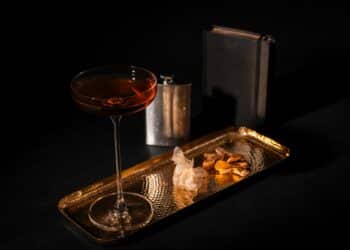How the renowned British chef achieved Michelin stardom while avoiding the pitfalls of fame.
By Crystal Chesters

Jason Atherton’s daily routine resembles that of a celebrity, with interviews, photoshoots, meetings and personal training sessions taking up much of his time. However, he is adamant that he is not, and never will be, a celebrity chef.
“We happen to have Michelin-starred restaurants in London but I don’t have my own TV show, I don’t open shops in malls – it’s just not what I do,” he tells Catering News during an interview at Marina Social in Dubai.
For Atherton, 45, food and family take precedence over fame. Aside from the more glamorous activities, his daily routine involves the morning school run – “I don’t miss it for anything” – followed by cooking in the kitchen at Pollen Street Social between 11.30am and 3pm and then cooking again, every evening at Pollen Street Social, City Social or Berners Tavern until midnight.
“I’m trying to be a good father, to inspire the next generation of chefs, to keep my integrity to myself and remain a chef – because so many people get pulled in different directions, like TV. They can pull you away from what you were originally good at.”
“Too often I hear people say they want to be chefs to have their own TV shows. Why? Be an actor instead! Being a chef is a freaking nightmare. You can’t be in a hot and sweaty kitchen your whole life unless you love it”
Atherton, who was trained under Marco Pierre White, Ferran Adrià and Gordon Ramsay, is best known as one of the pioneers of deformalised fine dining, and specialises in modern European cuisine with British ingredients.
“I was the first British chef to have a Michelin-quality restaurant where you can just go to have a beer; it had never been done before. You can book a table, have a starter, a drink and then leave. Whereas in the past, you had to have four courses minimum. That’s why I believe that even during the recession, Pollen Street Social was packed, and is every day, even today.”

Atherton has opened 21 restaurants in the UK, New York, Shanghai, Hong Kong, Dubai, Singapore and Australia in just seven years (three of which were sold to his partner), but he explains this as “a 30-year overnight success story”, given that he spent much of his tenure with Gordon Ramsay, opening restaurants across the globe.
“For 11 years of my life with Gordon I was doing this; I was flying to Australia to design his restaurant, flying to Cape Town to do the opening there for the One & Only. I was sent to Prague, New York, Macao, so I was doing meetings, business plans and designs. It was normal for me to continue doing what I did for Gordon, but for myself.”
Having first come to Dubai in 2000 to work for Ramsay’s Verre at Hilton Dubai Creek, Atherton – admitting he had no idea where Dubai was back then – has watched the emirate evolve into one of the most sought-after destinations for big-name chefs to open restaurants. “It’s changed massively. Gordon was the first named chef in the Middle East and pretty much now, every chef in the world has a restaurant here.”
And while he is impressed by the growth of the restaurant scene in Dubai, Atherton, who has three Michelin stars under his belt, believes the emirate could really benefit from the introduction of a Michelin Guide, which he thinks would help to set a benchmark for food quality rather than restaurant investment – and ratings – being driven purely by business and trends.
“At the moment, people open restaurants to be almost ‘Dubai-afied’. So you say everyone likes loud music, let’s put in a DJ booth – that would never happen in London. I don’t mean to be disrespectful but here most restaurants open for business purposes, whereas in London they are opened by young chefs who are passionate, and the last thing they think about is making money.
“I think the Michelin guide [in Dubai] would create that spirit of pure food quality. Michelin is not influenced by the best DJs or the best cocktail list. You might only have two people in the restaurant but if they think it’s a two-star restaurant, they will give it two stars and that really sets the benchmark for food quality”
“I think the Michelin guide [in Dubai] would create that spirit of pure food quality. Michelin is not influenced by the best DJs or the best cocktail list. You might only have two people in the restaurant but if they think it’s a two-star restaurant, they will give it two stars and that really sets the benchmark for food quality.”
Although critics have argued that Dubai is not ready for the Michelin guide because there are not enough restaurants that would be eligible for a star – and certainly none that would qualify for three stars – Atherton disputes this. “It launched in Brazil where there is no three-star restaurant; the highest rated is a two-star. There are two-star restaurants in Dubai and plenty of one-star restaurants.”
One of Atherton’s main ambitions for the future is achieving two stars at Pollen Street Social – the most highly rated restaurant in his portfolio – and he would also like to see his Dubai restaurant, Marina Social, gain a star if and when the Michelin Guide is introduced in the emirate.

“I would really like Pollen Street Social to get two-star status. That’s important to me because I would like to think I cooked at that level. I would be slightly disappointed if Marina Social didn’t get a star, but you don’t know.”
For Atherton, Marina Social is a successful outlet, but he believes there is still room for improvement. “Am I happy with the food? Yes. Can we improve it? Yes, of course we can; every year we are trying to improve the food. What’s important to me is that in five years’ time, it is still one of the top restaurants in Dubai.”
One of the dishes Atherton is most proud of at Marina Social is the Italian beef tomato with burrata and 25 years-aged balsamic and tomato salt, which was created by the restaurant’s chef patron, Tristin Farmer. “It’s so simple, but what I love about it is that you can be in New York and see that dish and recognise it’s from Dubai. That’s really cool.”
Atherton gives his chefs around the world the freedom to be creative, claiming they would get bored after six months if he didn’t. That said, he doesn’t let them change the menus right away. “When I put a new chef in, I don’t allow him to touch anything; once he gets settled in, I will come up with a new menu, cook it for him, we’ll eat it together. Once he starts to get to grips with it, we allow him to start being creative.”
In Shanghai, Atherton has a chef whose dishes he doesn’t touch because that chef has “nailed” his own style, however there have been occasions when he has had his fingers burned with chefs straying too far from the original concept.
“I put a chef into our restaurant in Hong Kong but I gave him the freedom to change the menu and because he was trying to impress people and impress me, the food just wasn’t right. All of a sudden, we went from having a really successful restaurant and two months later it was really struggling.

“I flew there immediately, tried the food and realised it was terrible. It was devastating but I didn’t tell him to walk away. I flew out a couple of guys from London and we stayed there all night to put the menu on and the guests started coming back. He thanks me every day because he has his own business now and he’s doing really well – it taught him about cooking for the customer, not yourself.”
This experience also taught Atherton an important lesson about being honest, and he believes this is key to his success.
“Your number one tool will always be your honesty. Chefs have this in-built thing where if someone criticises them, they get defensive. You as a chef know how good you are and when you’re cooking food that’s not good, you have to do something about it.”
Atherton offers the example of Temple and Sons, one of his recently-opened restaurants in London, which he admits isn’t busy enough.
“I was so proud of the food. The service could be better, but then it becomes difficult because you start asking yourself why it’s not busy. We’ve got to look at it in a totally different way and we are now examining it.
“Your number one tool will always be your honesty. Chefs have this in-built thing where if someone criticises them, they get defensive. You as a chef know how good you are and when you’re cooking food that’s not good, you have to do something about it”
“Maybe we got the décor a bit cold? Maybe the light is not quite right? All of these things could contribute to why it’s not busy. We’ve been working on it and slowly but surely, it’s starting to get busier. It’s important to be honest with yourself and deliver what you promised the customers you would deliver.”

And even with the restaurants that are performing well, Atherton prefers not to rest on his laurels. At Marina Social, for example, he would like to make a few improvements to the bar area and terrace.
“It’s about constantly improving things. We would like the bar to be more stand-alone, as currently people are just using it as a pre-drinks or post-drinks area. We might also build a little bar inside the restaurant and we’ll re-do the terrace when the restaurant is closed during the summer. I’d like it to have more of a Mediterranean feel.”
And given the success of his Dubai restaurant so far, would Atherton open a second venue in the Middle East? “I don’t think so; I don’t have time. I want to have focus and if the Michelin Guide comes here, I want this to be one-star and that takes work and effort. It’s not about opening more restaurants, it’s about working harder.”
For Atherton, passing his strong work ethic on to the next generation of chefs is another important part of his role, particularly as more and more young chefs get carried away with ambitions to achieve celebrity status.
“There’s no way around it,” he says. “In any industry, you cannot be successful by working a four-hour day. It just doesn’t work that way. The most successful people work like animals and you have to be slightly obsessed with something to be great at it.
“Too often I hear people say they want to be chefs to have their own TV shows. Why? Be an actor instead! Being a chef is a freaking nightmare! You can’t be in a hot and sweaty kitchen your whole life unless you love it,” he says.
“If you want to do it, you’ve got to do it for the right reason – because you love food. I am obsessed with food.”



































































